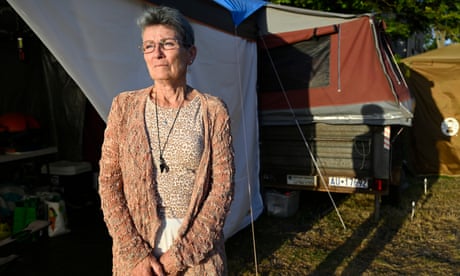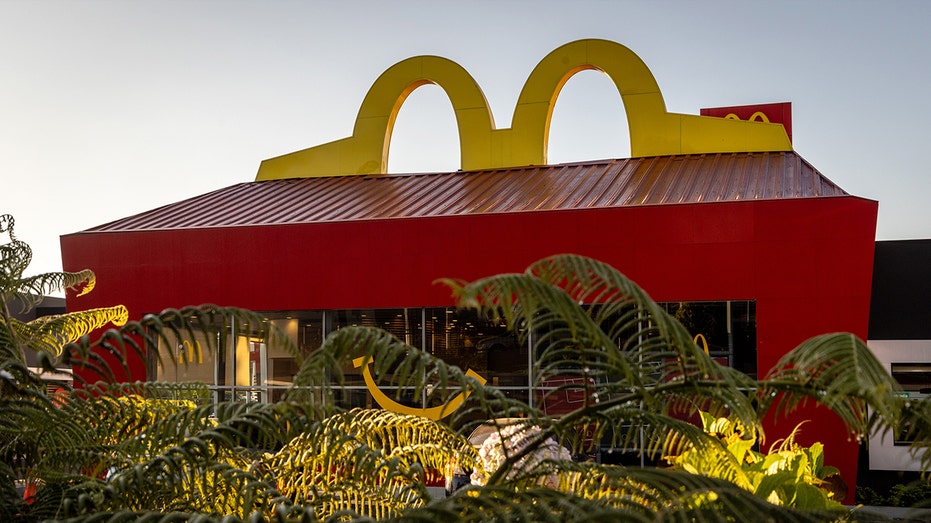- by foxnews
- 06 Apr 2025
‘It’s hard coming home to a tent’: the rise of Australia’s working homeless
‘It’s hard coming home to a tent’: the rise of Australia’s working homeless
- by theguardian
- 17 Dec 2022
- in news

At 5am most mornings, Cheryl Rowe's alarm wakes her up in the camping trailer where she has been living for three months. It signals time for the 63-year-old to start her work day as a cleaner.
Torch in hand, she gets ready and packs the car at the caravan park in Western Australia's Margaret River region. She has been asked to be quiet so as not to wake the tourists. Then she spends the rest of her day cleaning, part of it scrubbing holiday homes that sometimes sit empty.
"It's hard every night after work coming home to a tent rather than a home," says Rowe, who has been living at the campsite since her rental of five years was sold.
"You're living out of your car. You're living out of supermarket bags.
"I work full-time. I should be able to get a home."
Over the past two years, Australia has slipped into a new frontier of homelessness: people who are working yet still can't find an affordable home. Many are facing Christmas in tents, motels and caravan parks.
As chief executive officer of Mission Australia, Sharon Callister says: "When gainful employment is no longer enough for many Australians to guarantee a roof over their head, then you cannot deny the housing and rental market is in absolute crisis."
Across the country, people closest to the crisis say it is getting worse.
"Suddenly I realised all these people that were staying here were going off to work everyday and going to school and I'm thinking 'but why are they here in tents and caravans?'" says Scott Gadd, who manages the Hobart Showgrounds where a number of people struggling to find a home are living.
"It's an ongoing problem and it's getting worse, not better."
In the Bega Valley Shire on the south coast of NSW, the manager of the area's programs for Mission Australia, Donna Davis, says two to three years ago the service rarely had people asking for help who were working yet homeless.
"We'd maybe see it once a year then, now it's common," she says. "It's a new kind of homelessness. What we're seeing is something we've never seen before."
At the other end of the state in Byron Bay, Louise O'Connell, general manager at the Byron Community Centre which provides free breakfast says: "We've got workers that come and have breakfast and then the boss comes and picks them up out the front, and then they go home at night and sleep in their tent."
Housing affordability stress is now the fastest growing cause of homelessness in Australia, according to the latest Australian Homelessness Monitor. More than a quarter of people seeking support from homelessness services are without a home for this reason. (The most frequent cause remains family and domestic violence.)
Australians in regional areas are struggling most. The number of Australians experiencing homelessness has grown by 13% over the past four years, the monitor found. In regional Western Australia, where Rowe lives, the number has risen by 35%, the highest rate in the country.
Callister says a major issue has been people from the city flocking to regional and rural areas and pricing locals out. At the same time, vacancy levels have plummeted and natural disasters have wreaked havoc on available housing stock.
In the past year alone, rents have increased by 13.2% nationally, and in some regions by almost 25%. Meanwhile, Australians' wages have not kept pace. In May 2021, the average weekly income in Australia was $1,783.70. A year later it was $32.40 more. ABS data from September 2022 shows an annual wage increase of just 3%.
As Rowe has found, being homeless isn't cheap. She is paying $350 a week for a powered caravan park site and $270 a month to store her furniture.
"It's hard seeing that money go into staying at a caravan park instead of a home," she says.
But the hardest part of the whole ordeal, she says, was checking her terminally ill husband into hospital after she realised she couldn't care for him in a home, and a caravan park was her only option.
When he died two months ago, she kept the flowers from the funeral in the boot of her car and tent.
"That was difficult, very difficult," she says.
The homelessness services tasked to help Australians facing homelessness often find they cannot help those in need because there are few long-term housing options.
From 2020 to 2021, more than 109,000 Australians came to a homeless charity needing long-term housing, according to a report by Homelessness Australia.
A home was found for 3,713 people; 105,000 missed out.
For almost four months, Krystal Young has been living in a motel in Dubbo, with her partner and their four young boys, all aged under seven, in one room.
Young's partner works in a supermarket, and while Young herself mainly looks after her young sons, she also takes up Christmas casual work at the local Myer.
"We've tried to say to explain [to the kids] that we're just going on a little holiday and we've got a fun little adventure," she says. "But it's definitely hard on them, they've been getting sick a lot."
The family decided to move to the regional city in NSW's central west from Queensland after spending months staying with family in the state's tablelands region while they searched for a home. They thought they'd have more luck in Dubbo. But they have applied for property after property without any success.
They were placed in the motel via Link2Home, a statewide homelessness service, which enables them to stay two weeks at a time for the payment of two nights, equalling about $390.
Homelessness services are generally only funded to support people for a limited time, says Kate Colvin, Homelessness Australia's chief executive. And because of the housing shortage, often support runs out before a long-term option is found.
Young says their time is soon up, and fears they won't have found a home by the time they're expected to leave the motel.
"If that's the case, then we'll be in tents," she says.
Asked if they'd move again, Young says: "We'd like to stay in Dubbo, my son's doing really well in school and my other son's about to start school next year."
If nothing changes soon, Colvin says Australia is on a path reminiscent of the US where encampment communities for the homeless dot beaches, parks, and underpasses. One has already formed in Moruya on the NSW south coast, where the housing and homelessness crisis has become most visible as the council allows people to stay in campgrounds as long as they need because there's nowhere else for them to go.
"It's something the government can fix," she says. "We don't have to go down that path."
Independent senator for the ACT David Pocock has become a keen advocate on this issue as more and more people in his region struggle to find a home and contact his office for support. He says it highlights the urgent conversation that needs to be had on housing.
He says he's pushing the government to deal with the root causes of the issue, and that means building more social and affordable housing, improving rental rights, and having "some hard conversations on negative gearing and capital gains tax".
As Rowe nears the age she should be retiring, she hopes something changes soon.
"People say to me 'at least you've got somewhere to live', and I say 'what you think a tent is somewhere to live?'" she says. "I don't think so."
- by foxnews
- descember 09, 2016
Viral photo of McDonald's PlayPlace prompts superfan to reveal fast-food chain's stray from nostalgia
McDonald's superfan shares the standout PlayPlaces he has seen after a viral photo showed a "heartbreaking" McDonald's PlayPlace in Franklin, Tennessee.
read more


